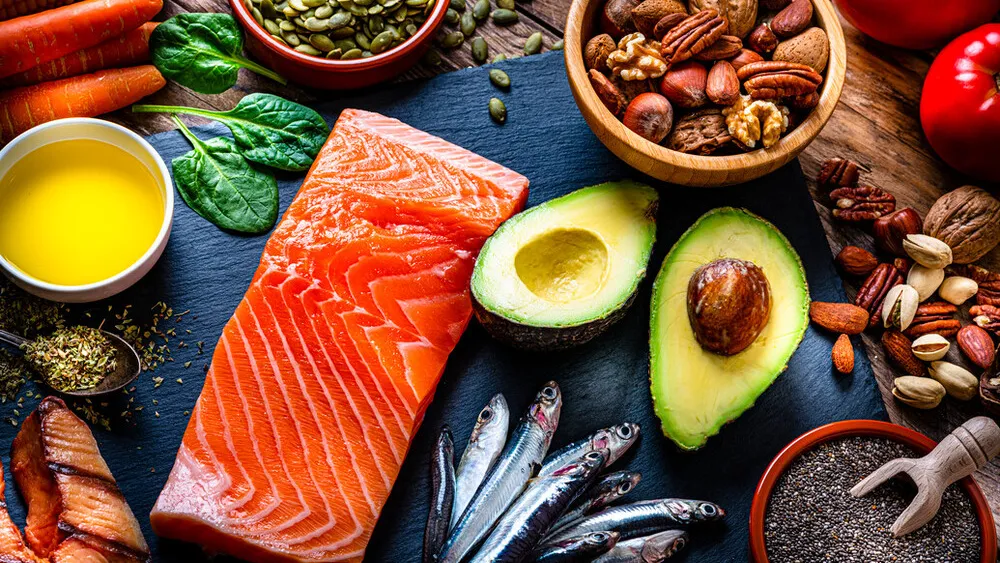Healthy Lifestyle
Better-mood food: A happier, more calm and focused you could start with your next bite
Published: May 1, 2024

A balanced diet can improve several aspects of your life, including your mental and emotional health.
One theory that supports the link between a balanced diet and decreased symptoms of anxiety and depression is the gut-brain connection. Your gastrointestinal tract – sometimes referred to as your “second brain” – is home to trillions of bacteria responsible for sending your actual brain messages.
The growth of good bacteria is dependent on nutrient-dense foods, which result in a flourishing gut microbiome that allows for the production of serotonin – or the “happy hormone.” The opposite is true with excessive amounts of energy-dense ultra-processed foods.
With a better understanding of what foods might contribute to mental health issues and what foods can help prevent them, you might be closer to a better mood than you think.
Processed vs. ultra-processed
There’s a common misconception that all processed foods – or foods that have been changed from their natural state by washing, cutting, heating, pasteurizing, canning, freezing, drying, etc. – are “bad.” However, not all processed foods are unhealthy. Many of them – like some fruits, vegetables, beans and rice – can absolutely fit into a balanced diet.
The Western diet, however, includes an overabundance of ultra-processed foods – or foods that largely lack fiber and are high in calories, refined carbohydrates, saturated fat, sodium and sugar. Foods like chips, candy, ice cream, soda, hot dogs and fries have the potential to alter the gut microbiome by introducing inflammation, and they provide little to no nutritional value for beneficial gut bacteria to grow. These foods are associated with increased symptoms of anxiety and depression.
Caffeine and cocktails
Coffee can provide energy and help you focus, and it may help prevent depression. The same is true for tea. But large amounts of caffeine (more than 400 milligrams daily) have been associated with an increased risk for anxiety. Although everyone’s tolerance to caffeine varies, sticking to three to five 8-ounce cups of coffee with minimal additions (cream, sugar, etc.) daily can help avoid anxious feelings or restlessness.
Alcohol – which can affect your overall mental state and sleep quality – is commonly thought to squash social anxiety and “take the edge off,” but it can leave you feeling more anxious when it wears off. It also hinders memory and coordination, which can indirectly affect how you feel mentally and emotionally. No more than one alcoholic drink per day for females and two for males is recommended to avoid any negative impacts from these beverages.
A Mediterranean mindset
Improving your state of mind may be as simple as adopting a more Mediterranean mindset. The Mediterranean diet – which is rich in unsaturated fats, complex carbohydrates, lean proteins and fermented foods – can improve mental health symptoms.
- Unsaturated fats are essential to brain function and necessary for the absorption of fat-soluble vitamins. They play a role in the production of serotonin and dopamine – another “happy” or “feel-good” hormone. Omega-3 fatty acids can help fight inflammation, which is commonly seen in those with mental health issues. Consider adding more fatty fish (salmon, sardines, tuna, trout and mackerel), flax seed and walnuts to your diet.
- Complex carbohydrates found in fruits, vegetables and whole grains can benefit your mental health by providing essential energy and fuel for proper brain function. Think apples, pears, berries, bananas, potatoes, peas, greens and beans as well as whole-grain bread, oatmeal and brown rice.
- Lean proteins contain amino acids, which help produce serotonin and dopamine. Try to limit minimally processed red meat to once or twice a week, and incorporate more eggs, poultry, fish, and pork tenderloin into your diet.
- Fermented foods like kimchi, yogurt, kombucha and kefir can improve your microbiome and mood by supporting the growth of beneficial bacteria. Remember, gut health can impact brain health!
More helpful food for thought
Much like ultra-processed foods, deficiencies in vitamin D, B vitamins, iron, magnesium and zinc are also associated with mental health issues. Although a quality multivitamin may help fill nutritional gaps, aim to fulfill your nutritional needs from whole-food sources, and know that quality exercise, sleep and stress management are also key to mental wellness.
Talk to your provider before making any major changes to your diet – including the addition of vitamins or supplements. And don’t hesitate to reach out to them if you feel that, despite your healthiest efforts, your physical or mental health need more support. Your Methodist care team is standing by to help you achieve your healthiest mind and body.


